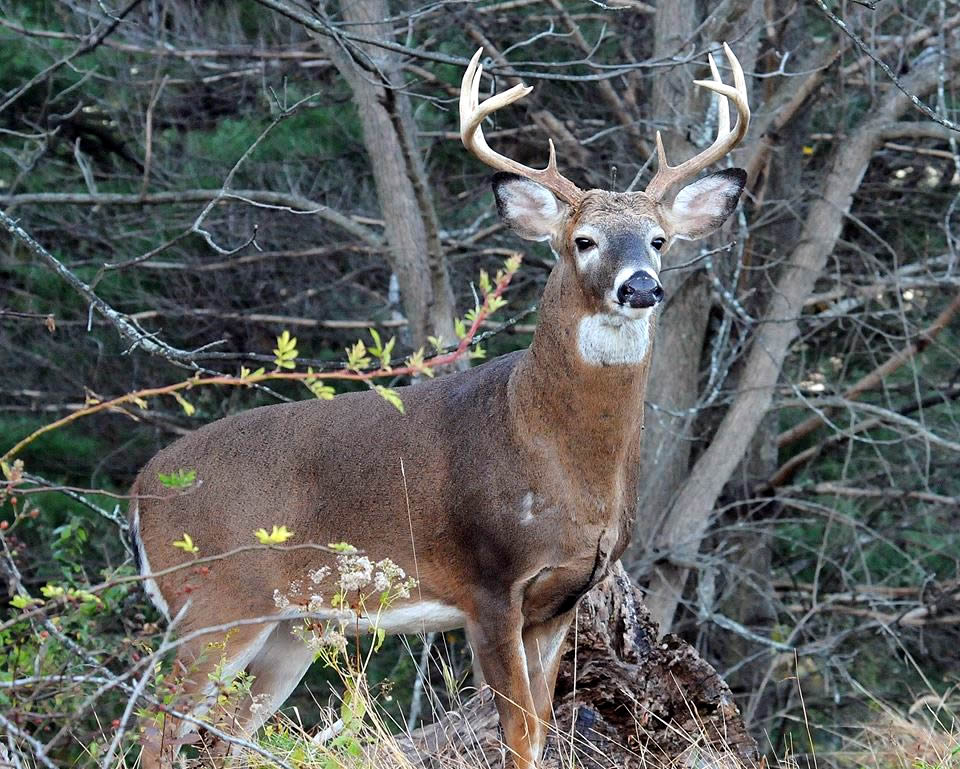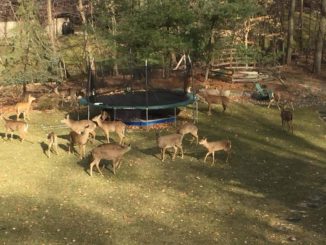
[slideshow_deploy id=’899′]
BY MICHAEL OLOHAN
OF PASCACK PRESS
RIVER VALE, N.J.—State wildlife officials in charge of approving lethal and non-lethal deer management plans were scheduled to meet Dec. 10 with River Vale Township council members—the latest Bergen County town to take on the “deer issue” that has stoked passionate debates between pro- and anti-hunting advocates.
River Vale officials recently vowed to hear “both sides” of the issue before making any final decisions, with Mayor Glen Jasionowski going out of his way calling for civil discourse among residents and social media posters discussing the issue. Previously, after years of opposing any type of local hunting to control deer, the mayor had voiced support for a likely bowhunt, although he remains open to alternatives, he said Oct. 22.
Local officials agreed to hear first from state Division of Fish and Wildlife officials at a Dec. 10 workshop and then hear from advocates of non-lethal deer management—the Animal Protection League of New Jersey—at another meeting before deciding on a preferred method to control what Jasionowski called “one of the biggest issues I face as mayor.”
During the Oct. 22 council meeting, Jasionowski said as a result of statements he made supporting a possible local bowhunt, some social media critics had made disparaging characterizations about him and he urged commenters to address each other with courtesy and civility.
Over the past several years, numerous mayors and public officials have suggested the need for a “regional solution” to the deer overpopulation issue, and many Pascack Valley mayors appear to be watching what happens in River Vale, including Woodcliff Lake Mayor Carlos Rendo, who said that River Vale is taking the lead role on the deer overpopulation issue among Pascack Valley towns.
‘I welcome opinions’
“I’ve become the most popular person on email, phone, social media, letters from just about everywhere you can imagine…I welcome the feedback, I welcome the points, I welcome the opinions on both sides,” Jasionowski said Oct. 22
“People that know me, and I’ll say this every time, know I’m not pro-hunting—I’m not a hunter, I don’t like weapons. Again, my responsibility is to this town so I’ll look at both areas,” he said at the council meeting.
“What does get me upset, though, is every once in a while where people make this a dirty fight. Someone actually compared me to a serial killer on social media so all I’m trying to do is come up with a solution for the Township of River Vale, whether or not you agree with my decision at the end or not, you’re allowed to disagree or allowed to agree to disagree but let’s all just keep the conversation civil,” he said.
He said following a meeting with state officials, River Vale will hear from Animal Protection League of New Jersey representatives, and then the mayor will make available “all that we have internally from police, etc., and we’ll make our final decision to move forward,” he said.
‘An informed decision’
Councilman John Donovan said he looked forward to upcoming discussions with state fish and wildlife officials and non-lethal deer management advocates. “As everyone knows me, I’m a facts guy, so I look forward to seeing both sides presented to us and being able to make an educated and informed decision,” he said.
Council President Mark Bromberg said “we’re going to strive as a governing body and the administration to make this a search for the facts and we’re going to keep things civil and under control,” he noted. He said the council would “do our best to come up with the best decision for River Vale and our residents, whatever that may be.”
Non-lethal plan nixed
During an Oct. 9 presentation to Bergen County’s League of Municipalities at Arena Diner, Hackensack, Animal Protection League of New Jersey’s Doris Lin, director of legal and government affairs, told about 20 mayors and local officials that the state Division of Fish and Wildlife was “biased against non-lethal fertility control from the beginning.”
Lin told the mayors’ group that Saddle River submitted “an excellent application” to state officials this year that was rejected.
That application was initially submitted in October 2017 for Saddle River to perform surgical sterilization of does.
However the state sent the application back for technical deficiencies. Saddle River resubmitted an amended application for a non-lethal deer management program in late April 2018, which was subsequently rejected by state Fish and Wildlife officials in May 2018. The state cited numerous deficiencies in the application and specified two reasons for rejection.
The two reasons noted the non-lethal plan “cannot be both a population reduction and an experiment to determine population impacts” and “fertility research projects conducted in other states are numerous in results with low expectations of successfully reducing deer in an open population or reducing human-deer conflicts in a timely or cost-efficient manner.”
‘Low likelihood of success’
The rejection letter cites five application deficiencies in Saddle River’s amended application.
“Although this application remains rife with procedural deficiencies, the Division of Fish and Wildlife is denying this because of the low likelihood of success,” notes a four-page rejection letter signed by the division’s bureau chief Carole Stanko.
Lin urged the mayors’ group “to tell the state (agency) that they should change the policies” that caused them to reject the surgical sterilization plan submitted by Saddle River and called the plan’s rejection “disappointing. I’m sad to say that I don’t think other towns will do much better without a change in policy at the Division of Fish and Wildlife,” she said.
In place of the rejected sterilization plan, Saddle River approved a controlled bowhunt and a contract with United Bowhunters of New Jersey. After being temporarily halted due to a lawsuit filed by the Animal Protection League objecting to technical deficiencies, the hunt was allowed to continue.
Efforts to reach Saddle River Borough Administrator Jerry Giaimis for an update on the continuing bowhunt were not returned by press time.
Non-lethal control options
Lin said two recommended non-lethal population control methods favored by the League include deer sterilization and contraception.
Sterilization occurs via surgical removal of doe ovaries— called ovariectomies—costing about $1,200 per deer. Another option is immunocontraception, which involves injecting pig enzymes into female deer, including two initial doses and annual boosters. She did not provides costs for deer contraception.
In addition to fertility controls, she told mayors that “simple, common-sense cautions” can help minimize human-deer conflicts.
These include reflectors on one side of the road, wrapping a pole with white fabric (mimicking a deer’s raised tail signal for danger), and drivers slowing down and being alert to deer on sides of roads as deer are ‘edge dwellers’, she said.
Lin also recommended planting deer-resistant plants, adding plants with a strong smell, hanging bars of soap to repel deer, spreading deer/rabbit repellent, and absolutely not feeding any wildlife, including deer.
River Vale adopted an ordinance to prohibit wildlife feeding earlier this year.
[slideshow_deploy id=’899′]
RELATED: How to Deal With the Deer? Town Weighs a Hunt, Alternatives

